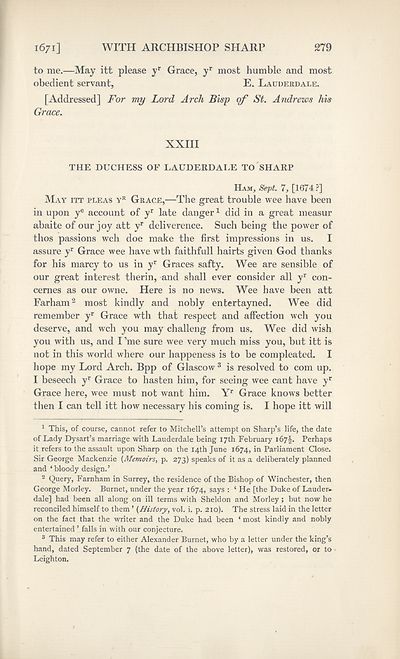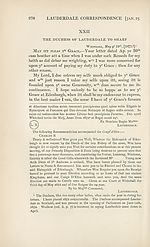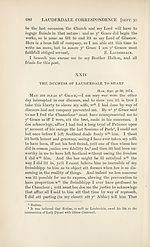Series 1 > Miscellany of the Scottish History Society (First volume)
(374) Page 279
Download files
Complete book:
Individual page:
Thumbnail gallery: Grid view | List view

WITH ARCHBISHOP SHARP
279
1671]
to me.—May itt please yr Grace, yr most humble and most
obedient servant, E. Lacuerdale.
[Addressed] For my Lord Arch Bisp of St. Andrews his
Grace.
XXIII
THE DUCHESS OF LAUDERDALE TO SHARP
Ham, Sept. 7, [1674?]
May itt pleas yr Grace,—The great trouble wee have been
in upon ye account of yr late danger1 did in a great measur
abaite of our joy att yr deliverence. Such being the power of
thos passions wch doe make the first impressions in us. I
assure yr Grace wee have wth faithfull hairts given God thanks
for his marcy to us in yr Graces safty. Wee are sensible of
our great interest therin, and shall ever consider all yr con-
cernes as our owne. Here is no news. Wee have been att
Farham2 most kindly and nobly entertayned. Wee did
remember yr Grace wth that respect and affection wch you
deserve, and wch you may challeng from us. Wee did wish
you with us, and I ’me sure wee very much miss you, but itt is
not in this world where our happeness is to be compleated. I
hope my Lord Arch. Bpp of Glascow 3 is resolved to com up.
I beseech yr Grace to hasten him, for seeing wee cant have yr
Grace here, wee must not want him. Yr Grace knows better
then I can tell itt how necessary his coming is. I hope itt will
1 This, of course, cannot refer to Mitchell’s attempt on Sharp’s life, the date
of Lady Dysart’s marriage with Lauderdale being 17th February 167J. Perhaps
it refers to the assault upon Sharp on the 14th June 1674, in Parliament Close.
Sir George Mackenzie {Memoirs, p. 273) speaks of it as a deliberately planned
and ‘bloody design.’
2 Query, Farnham in Surrey, the residence of the Bishop of Winchester, then
George Morley. Burnet, under the year 1674, says : ‘ He [the Duke of Lauder¬
dale] had been all along on ill terms with Sheldon and Morley; but now he
reconciled himself to them ’ {History, vol. i. p. 210). The stress laid in the letter
on the fact that the writer and the Duke had been ‘ most kindly and nobly
entertained ’ falls in with our conjecture.
3 This may refer to either Alexander Burnet, who by a letter under the king’s
hand, dated September 7 (the date of the above letter), was restored, or to
Leighton.
279
1671]
to me.—May itt please yr Grace, yr most humble and most
obedient servant, E. Lacuerdale.
[Addressed] For my Lord Arch Bisp of St. Andrews his
Grace.
XXIII
THE DUCHESS OF LAUDERDALE TO SHARP
Ham, Sept. 7, [1674?]
May itt pleas yr Grace,—The great trouble wee have been
in upon ye account of yr late danger1 did in a great measur
abaite of our joy att yr deliverence. Such being the power of
thos passions wch doe make the first impressions in us. I
assure yr Grace wee have wth faithfull hairts given God thanks
for his marcy to us in yr Graces safty. Wee are sensible of
our great interest therin, and shall ever consider all yr con-
cernes as our owne. Here is no news. Wee have been att
Farham2 most kindly and nobly entertayned. Wee did
remember yr Grace wth that respect and affection wch you
deserve, and wch you may challeng from us. Wee did wish
you with us, and I ’me sure wee very much miss you, but itt is
not in this world where our happeness is to be compleated. I
hope my Lord Arch. Bpp of Glascow 3 is resolved to com up.
I beseech yr Grace to hasten him, for seeing wee cant have yr
Grace here, wee must not want him. Yr Grace knows better
then I can tell itt how necessary his coming is. I hope itt will
1 This, of course, cannot refer to Mitchell’s attempt on Sharp’s life, the date
of Lady Dysart’s marriage with Lauderdale being 17th February 167J. Perhaps
it refers to the assault upon Sharp on the 14th June 1674, in Parliament Close.
Sir George Mackenzie {Memoirs, p. 273) speaks of it as a deliberately planned
and ‘bloody design.’
2 Query, Farnham in Surrey, the residence of the Bishop of Winchester, then
George Morley. Burnet, under the year 1674, says : ‘ He [the Duke of Lauder¬
dale] had been all along on ill terms with Sheldon and Morley; but now he
reconciled himself to them ’ {History, vol. i. p. 210). The stress laid in the letter
on the fact that the writer and the Duke had been ‘ most kindly and nobly
entertained ’ falls in with our conjecture.
3 This may refer to either Alexander Burnet, who by a letter under the king’s
hand, dated September 7 (the date of the above letter), was restored, or to
Leighton.
Set display mode to:
![]() Universal Viewer |
Universal Viewer | ![]() Mirador |
Large image | Transcription
Mirador |
Large image | Transcription
Images and transcriptions on this page, including medium image downloads, may be used under the Creative Commons Attribution 4.0 International Licence unless otherwise stated. ![]()
| Scottish History Society volumes > Series 1 > Miscellany of the Scottish History Society (First volume) > (374) Page 279 |
|---|
| Permanent URL | https://digital.nls.uk/127085349 |
|---|
| Attribution and copyright: |
|
|---|
| Description | Over 180 volumes, published by the Scottish History Society, containing original sources on Scotland's history and people. With a wide range of subjects, the books collectively cover all periods from the 12th to 20th centuries, and reflect changing trends in Scottish history. Sources are accompanied by scholarly interpretation, references and bibliographies. Volumes are usually published annually, and more digitised volumes will be added as they become available. |
|---|


